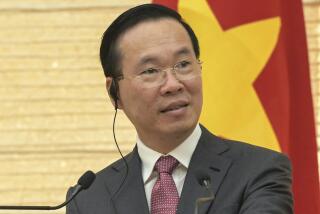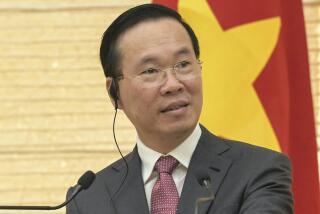Sihanouk Resigns as President of Cambodia Exile Government
- Share via
BEIJING — Prince Norodom Sihanouk resigned Saturday as president of Cambodia’s exile government and broke with its 6-year-old resistance coalition, blaming internal strife over his peace talks with the country’s Vietnam-backed regime.
Sihanouk, who last May took a “leave of absence” in a similar protest, bitterly criticized the infighting that has torn the coalition since its formation in 1982 by the three main factions fighting Vietnamese occupation troops in Cambodia.
The exile Coalition Government of Democratic Kampuchea (Cambodia), with Sihanouk its best-known leader, is widely recognized outside the Soviet Bloc as Cambodia’s legitimate government, and holds Cambodia’s seat in the U.N. General Assembly. Its rebels have battled Vietnamese troops since Hanoi invaded in December, 1978, and installed a new regime.
In a statement in French, issued from his residence in Beijing and delivered to news agencies, Sihanouk, 65, said he was resigning as president “definitively, irrevocably and irreversibly.”
He said it is “no longer possible to maintain” his connection with his resistance partners, the communist Khmer Rouge--the largest resistance faction--and the Khmer People’s National Liberation Front led by Son Sann, prime minister of the exile coalition.
The move cast doubt over Sihanouk’s recent peace initiative in two rounds of talks in France with Hun Sen, premier of the Hanoi-backed government in Phnom Penh.
Sihanouk did not say if he would scrap a third round of talks slated for April. He arrived in Beijing on Thursday after the second round, and said the talks had “not much chance” of success.
The resignation apparently does not mean an immediate breakup of the coalition. Sihanouk said he would appoint his son, Prince Norodom Ranariddh, to replace him as leader of his faction.
But he accused Son Sann of “unceasingly showing himself extremely hostile to my person, my army and my party.” He said Son Sann accused him of “national treason” for the peace talks.
More to Read
Sign up for Essential California
The most important California stories and recommendations in your inbox every morning.
You may occasionally receive promotional content from the Los Angeles Times.










